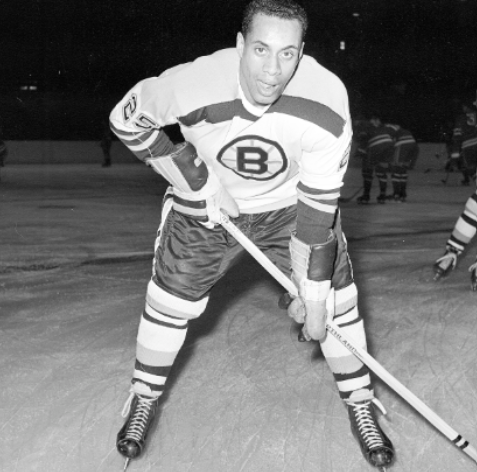People who overcome discrimination, racism, and obstacles to achieve their dreams inspire and encourage many of us not to give up and try our best to reach our own goals. To honour Black History Month of 2024, let’s dive into William O’Ree’s story of perseverance and bravery.
Who is Willie O’Ree?
William O’Ree was born on October 15, 1935, in Fredericton, New Brunswick. He became the first black hockey player in the National Hockey League (NHL) on January 18, 1958, and played professional hockey for over 20 years.
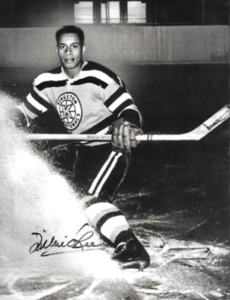
Childhood in New Brunswick
O’Ree grew up in a large family in Fredericton, New Brunswick, and was the youngest of 13 children. O’Ree’s grandparents left the United States to escape slavery throught the Underground Railroad to Canada. O’Ree’s family was an ethnic minority in Fredericton as his family was the only one of two Black families in Fredericton while he was growing up.
O’Ree’s passion for hockey has been noticeable since he was young, as he started playing hockey when he was three. He played regularly on the backyard rink and even skated to school when the weather allowed.
O’Ree recalled that his experience of growing up in New Brunswick was a positive memory for him in his autobiography called The Willie O’Ree Story: Hockey’s Black Pioneer. In his early life, he recalled that colour was never an issue on ice rinks. However, he wrote that when he became older, he faced discrimination from the colour barrier.
Early Hockey Career and Eye Injury
O’Ree started playing organized hockey with Richard, his brother when he was 14 years old. He continued his hockey career by playing for Fredericton Falcons in the New Brunswick Amateur Hockey Association when he was 15, and he played for Quebec Frontenacs of the Quebec Junior Hockey League when he was 19 years old.
When O’Ree was playing for the Kitchener Canucks of the Ontario Hockey Association during the 1955-56 season, he had a serious injury. 95 percent of the vision in his right eye was lost after a puck hit him and also broke his cheekbone and nose. Healthcare professionals recommended him to stop playing hockey, but he couldn’t lose his dream and was back on ice within two months. However, as NHL law states that the league forbade players who are blind in one eye from competing, O’Ree could not tell anyone about the injury as he would lost his chance to play for NHL. In order to compensate for his blindness, O’Ree had to turn his head far over his right shoulder while playing left wing.
His Career in the NHL
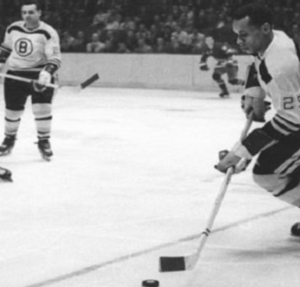
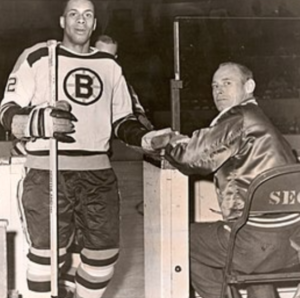
O’Ree became the first Black hockey player to play in the National Hockey League on January 18, 1958, as a part of the Boston Bruins. He only played two games in the 1957-58 season in Bruins but returned in the 1960-61 season. O’Ree made history as he became the first Black player to score a goal in the NHL in a 3-2 win over the Canadiens. He scored 4 goals and 10 assists for 14 points in 43 regular-season games in the 1960-61 season.
At the time, there was not much of O’Ree’s status as the first Black player to compete in the NHL.Neither The Boston Globe nor The New York Times mentioned his first appearance in the NHL. Additionally, at the time, a Canadian sports writer noted that O’Ree received no emotion, no applause, and above all, no animosity.
O’Ree played 14 years in hockey, including with the Hull-Ottawa Canadiens, Los Angeles Blades, San Diego Gulls, New Haven Nighthawks, and San Diego Mariners. He extended his career by moving from left wing to right wing in 1964-65, resulting in 38 goals, a personal best.
Colour Barrier
O’Ree faced hardships in his hockey career because of his skin colour. From opposing players and fans, he had to experience racial taunts. Cotton balls and a black cat were thrown onto the nice while O’Ree played in Virginia in the 1972-73 AHL season. When he was playing with the Bruins in the 1960-61 season, O’Ree was the victim of racial slurs from a Chicago Black Hawks player. In addition, the player knocked out O’Ree’s teeth and butt-ended O’Ree with the stick.
In 2022, O’Ree interviewed with Trevor Noah and described the obstacles that he had to face as a Black hockey player of NHL. He says, “I was called the N-word every time I stepped on the ice by players on the opposition, by fans in the stands—if I had a penalty and I went in the penalty box I could hear them saying the N-word—but I just blocked it out. Thanks to my older brother…he told me, “Willie, if they can’t accept you for the individual that you are, because you have the skills and the ability to play in the league at this particular time,…forget about everything else. Just go out, stay focused on your goal, and work hard.” And, basically, that’s what I did. But…it was really rough at the beginning.”
Honour
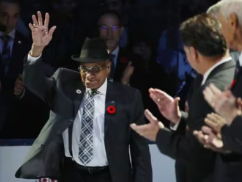
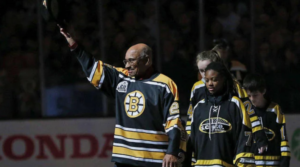
He won the Lester Patrick Trophy in 2003 for his superb service to hockey in the United States. He also received the Order of Canada in 2010 for his outstanding work promoting hockey and youth development within North America. In addition, O’Ree also received the Order of the New Brunswick in 2005 and received the title of honoured member of the New Brunswick Sports Hall of Fame in 1984. In 2022, the Boston Bruins retired his number, 22, to honour him.
Legacy
Throughout his career, O’Ree’s legacy contributed to motivating generations of Canadians through his dedication to promoting a diverse and inclusive environment in hockey. Even though O’Ree retired in 1979, his path still inspires many youths all around the world and gives them a message to follow their dreams despite prejudice and obstacles. O’Ree continues his legacy with a position as a head of the Hockey is for Everyone program, where he promotes perseverance, teamwork, and commitment as important values to host an annual all-star weekend to bring youth of diverse and unique backgrounds of economics and ethnicity together for a tournament.
His legacy inspired the world, but his remarkable story didn’t finish with a period yet. Most recently, William O’Ree earned the title of the NHL’s Director of Youth Development and an ambassador of the NHL Diversity program. He travelled across North America to promote grassroots hockey programs focusing on helping economically disadvantaged children. According to a 2008 Sports Illustrated piece, He said this was the most rewarding job he’d ever done.
“Breaking into the NHL was great, but the work that I’m doing now has to be the most rewarding job I’ve ever had,” says O’Ree, 72. “People say to me, ‘Willie, do you think you’ll ever get into the Hall of Fame?’ If I get in, it won’t be because I broke the colour barrier. It will be because of the work I’m doing now.”
O’Ree’s work on and off the ice rink was recognized, and he was inducted into the Hockey Hall of Fame in 2018. The NHL also created the Willie O’Ree Community Hero Award to honour him.
Sources 1 / 2 / 3 / 4 / 5 / 6 / 7 / 8 /

